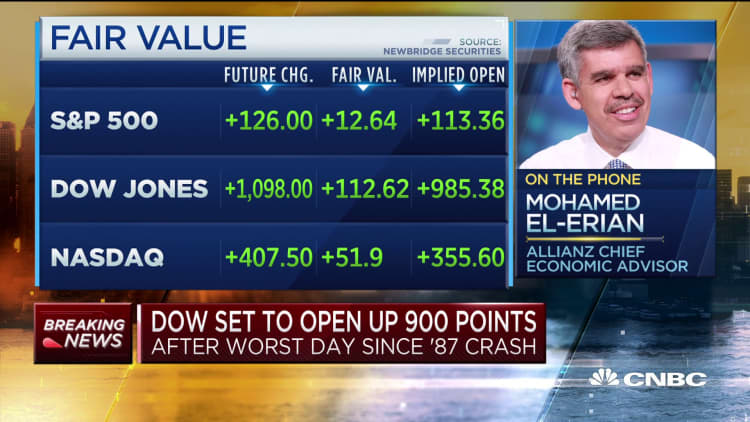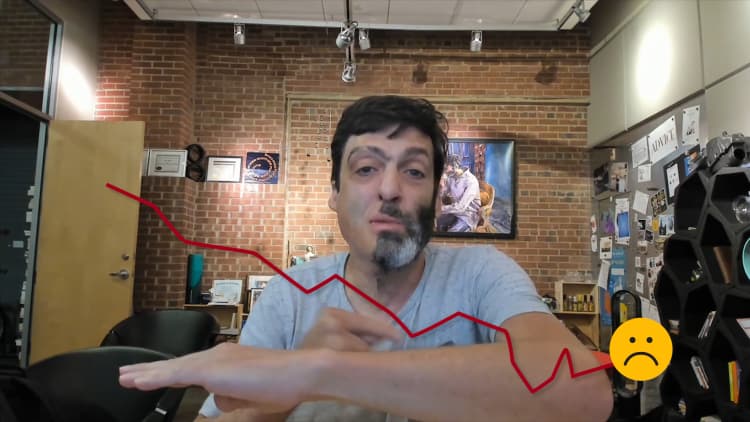
Stocks soared Friday as Wall Street rebounded from the sharp losses suffered in the previous session — the worst since the "Black Monday" market crash in 1987.
The Dow Jones Industrial Average closed 1,985 points higher, or 9.4%, at 23,185.62. Friday marked the Dow's biggest-ever point gain. The S&P 500 climbed 9.2% to 2,711.02 while the Nasdaq Composite surged 9.3% to 7,874.23. The averages posted their biggest one-day gain since October 2008.
"Volatility, I always remind people, means big moves in both directions," said Randy Frederick, vice president of trading and derivatives at Charles Schwab. "After as big of a rout as we've seen in the last 30 days, it's not at all surprising to see at least a little bit of a bounce."
Equities rallied to their session highs into the close after President Donald Trump also said 50,000 new coronavirus tests will be available next week. Trump also said he asked the Energy Department to purchase oil for the U.S. strategic petroleum reserve, boosting crude prices.
"This is certainly an important step forward. The first thing we learned from South Korea is you need to understand the scope of the problem, and you need to identify the disease and who has it and who does not," said Ed Keon of QMA. "Today will be an important step forward…You saw a big drop when the response seemed inadequate and then when you had a more aggressive response, the market responded positively."
Stocks began the day higher on the hopes of bigger fiscal stimulus from the U.S. government and others around the world. Treasury Secretary Steven Mnuchin told CNBC's "Squawk on the Street" the White House and Congress were nearing a deal. "The president is absolutely committed that this will be an entire government effort, that we will be working with the House and Senate," Mnuchin said.
House Speaker Nancy Pelosi said U.S. lawmakers and the White House were close to a deal on economic relief amid the coronavirus outbreak. "We've resolved most of our differences," Pelosi told reporters Thursday evening, noting it's about "testing, testing, testing."
Also helping equities on Friday, the Federal Reserve said it will start buying Treasurys across all durations, starting with 30-year bonds. "These purchases are intended to address highly unusual disruptions in the market for Treasury securities associated with the coronavirus outbreak," the New York Fed said in a statement.
Apple and Facebook jumped more than 10% each to lead the so-called FAANG stocks higher. Google-parent Alphabet gained 9.3% while Amazon and Netflix both rose more than 6%.
For the week, the major averages posted steep losses despite Friday's sharp gains. The Dow lost 10% this week while the S&P 500 and Nasdaq slid more than 8% each.
Friday's action followed the official end of the longest bull-market run in history. The S&P 500 plummeted 9.5% Thursday in its worst day in more than three decades, joining the Dow in a bear market, or more than 20% from its recent peak. The Dow also suffered its worst point drop ever and the biggest percentage decline since 1987.
"It almost seems as if the market has a gravitational force to that Dec. 24, 2018 low," said Quincy Krosby, chief market strategist at Prudential Financial. "It feels as though the market wants to go back there."
"That said. there has been indiscriminate selling, which is good thing," said Krosby. "That's the kind of panic you wait for."
Investors were bombarded with a slew of negative headlines about the fast-spreading coronavirus this week. The NCAA has canceled its March Madness basketball tournaments, a day after the National Basketball Association suspended the remainder of its season indefinitely. New York Mayor Bill de Blasio declared a state of emergency, while new restrictions for large events and businesses were imposed.
"We expect volatility to remain for a while," said Gene Goldman, head of research at Cetera Investment Management. "There's so much unknown about the virus and the economic impact."
"It's not wrong that markets are up today. There are multiple reasons for why we're up ... With that said, we do see more weakness going forward," he said.
Subscribe to CNBC PRO for exclusive insights and analysis, and live business day programming from around the world.

—CNBC's Patti Domm contributed to this report.
Clarification: This story has been updated to clarify Frederick's quote to say "days" instead of "years:" "After as big of a rout as we've seen in the last 30 days, it's not at all surprising to see at least a little bit of a bounce."

